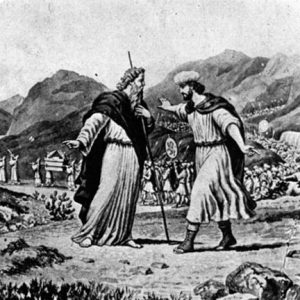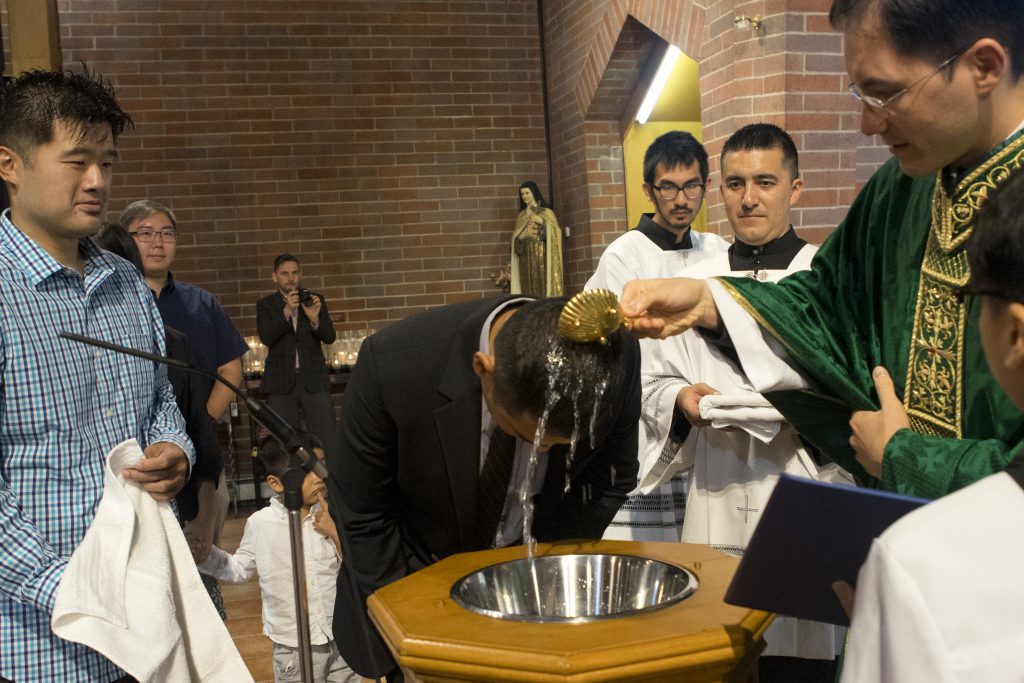Pray, pay and obey—do we know to what that refers? Pray, pay, and obey. Many people, especially in the past, thought this is what your job was as Catholics. Priests and sisters do the teaching, attend to the sacraments, and manage all the church business, while lay Catholics support us. Consequently, when lay people now hear priests say that they’re supposed to become saints and share in the mission of the Church, they respond, “That’s your job. That’s what we pay you for.”
There’s a massive cultural Catholic lie that says priests and sisters are the holy ones while lay Catholics are the regular people. That’s why when people ask for a house blessing, I say, “Deacon Andrew is entrusted with that ministry here,” and they reply, “But we want you to do it, Father.” Did you know that hurts Deacon Andrew’s feelings? He’s come to me before, you know, and cried, “No one loves me, Father.” And I say, “I love you, Deacon. You can bless my house, if you want.”
Listen to the response of Moses in the First Reading. It says, “The Lord came down in the cloud, took some of the spirit that was on Moses and put it on the seventy elders. When the spirit rested upon them, they prophesied” (Num 11:25). The context is that the Hebrew people were complaining against God and Moses while they were stuck in the desert, and so God gave Moses help by blessing these 70 men. Nevertheless, when Eldad and Medad, who weren’t part of the 70 men, also started prophesying, Joshua asked Moses to stop them. Moses, however, responded, “Would that all the Lord’s people were Prophets, and that the Lord would put his spirit on them!” (11:29).

 Notice Moses’ desire: He wants all people to prophesy, that is to say, to reveal God’s face, to show others the right path to take. Moses’ desire reflects God’s desire, that all His people become saints, that all evangelize and serve.
Notice Moses’ desire: He wants all people to prophesy, that is to say, to reveal God’s face, to show others the right path to take. Moses’ desire reflects God’s desire, that all His people become saints, that all evangelize and serve.
Remember these famous words of Jesus, “You, therefore, must be perfect, as your Heavenly Father is perfect” (Mt 5:48)? To whom were they addressed? Just the apostles? No, all His disciples. St. Paul wrote similarly, “This is the will of God, your sanctification” (1 Thess 4:3). That’s why it’s official Church teaching that all Catholics are called to be saints (Lumen Gentium, 39-42).
Richard, Simon, and Janis were all baptized recently and Jack will be baptized in November. St. John Paul II said, when we ask someone, “Do you wish to receive baptism?” we’re asking them at the same time, “Do you wish to become holy?”
This logically applies to every person because Jesus died for everyone. He died so that they may become holy. Now you know why, every single Sunday, our parish talks about the call to holiness in our vision. We need to be reminded constantly about our calling by God. This is also why we show so many saints with their photographs, pictures, or icons, and emphasize lay saints, so that we know this is possible. A major spiritual turning point occurs when we realize that becoming a saint is possible for us. Some people have told me: When they realized it’s possible for them to become a saint, things in their life changed; they felt they could start making real progress.
So, how do we become saints? One answer is when God perfects our love. Our love right now is good, but is usually filled with selfishness and lukewarmness; it’s conditional and meager. It needs to become like Jesus’ love.
 Since we’re continuing our five-month focus on the virtue of hospitality, we should look at a verse from today’s Gospel where Jesus says, “Truly I tell you, whoever gives you a cup of water to drink because you bear the name of Christ will by no means lose the reward” (Mk 9:41). First of all, whenever Jesus says, “Truly I tell you,” or “Amen I say to you,” He’s saying something absolutely authoritative and solemn, so we better listen up (Mary Healy, The Gospel of Mark, Catholic Commentary on Sacred Scripture, 78). And what He says here is that whoever does a small humble act of kindness because someone’s associated with Him will receive a reward. Is something so small that important?
Since we’re continuing our five-month focus on the virtue of hospitality, we should look at a verse from today’s Gospel where Jesus says, “Truly I tell you, whoever gives you a cup of water to drink because you bear the name of Christ will by no means lose the reward” (Mk 9:41). First of all, whenever Jesus says, “Truly I tell you,” or “Amen I say to you,” He’s saying something absolutely authoritative and solemn, so we better listen up (Mary Healy, The Gospel of Mark, Catholic Commentary on Sacred Scripture, 78). And what He says here is that whoever does a small humble act of kindness because someone’s associated with Him will receive a reward. Is something so small that important?
In the 500s, St. Benedict started his monasteries and changed Western civilization. He wrote some guidelines for his monks on how to live, now called “The Rule of St. Benedict.” Chapter 53 is on the reception of guests. He says that, when a guest comes to a monastery, they’re supposed to be shown all honour; the abbot or all the monks are supposed to greet them, then pray together, and then give the kiss of peace; the monks are supposed to bow their heads or lie on the ground towards the guest; then they’re supposed to sit with the guest, read them parts of the Bible, and even stop their rigorous fast in order to eat with the guest. Finally the monks are supposed to wash the guest’s feet.
Is hospitality really that important? Yes! Because a guest is like Christ. The rule says: “Let all guests who arrive be received like Christ, for He is going to say, ‘I came as a guest, and you received Me’ (Matt. 25:35)… Let the head be bowed or the whole body prostrated on the ground in adoration of Christ, who indeed is received in their persons… In the reception of the poor and of pilgrims the greatest care… should be shown, because it is especially in them that Christ is received.” St. Benedict keeps on repeating that when we welcome a guest, we receive Jesus.
Does anyone know what this Latin phrase means? “Venit hospes, venit Christus.” It means, “A guest comes, Christ comes.” It’s based on St. Benedict’s rule. I saw it last week in Rome and loved it.
 St. Benedict said his rule was written for “beginners” (Chapter 73) on the road to perfection. So, for us, hospitality is part of the starting point on the path to sainthood.
St. Benedict said his rule was written for “beginners” (Chapter 73) on the road to perfection. So, for us, hospitality is part of the starting point on the path to sainthood.
Questions: What if we can’t love like this every week? What if we don’t have the emotional energy to reach out to people every week? Someone told me she once went to Mass at another church because she didn’t have the energy to greet everyone here; for me, too, there are times when I don’t feel like greeting. The answer is: Let’s do our best. On the one hand, we have to take care of our legitimate needs. There are times when we’re struggling and need to reach out to our spiritual friends for support. But, on the other hand, the more we encounter Jesus’ love, grow in virtue, and the more our Mass is fruitful, we’ll feel this desire to reach out.
In some ways, we can measure our level of love by our desire to love. On the days when we have no energy and are still struggling with shyness (and remember, shyness is not a virtue), the question is: Do we still wish we could reach out to people? That desire to give someone a spiritual cup of water is a measure of our love.
 Today, we could once again introduce ourselves to someone we don’t know. Secondly, as part of our divine renovation, we want to take a quick survey of our hospitality here at the parish. We’ll do this right after the homily.
Today, we could once again introduce ourselves to someone we don’t know. Secondly, as part of our divine renovation, we want to take a quick survey of our hospitality here at the parish. We’ll do this right after the homily.
This leads to our final question: Who’s responsible for hospitality at our parish? Is it I, Deacon Andrew, the Hospitality Team? The answer is: everyone. As baptized Catholics, you’re part of the Team. You’re called to be saints, it is possible, and extending hospitality is part of being a saint.
